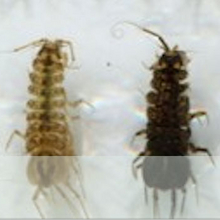Abteilung Fischökologie & Evolution
Öko-Evolutionäre Dynamiken
Wir sind Teil des Instituts für Integrative Biologie (IBZ) am Departement Umweltsystemwissenschaften (D-USYS) der ETH Zürich. Unsere Gruppe arbeitet an der Eawag in Kastanienbaum, wo unsere Büros und Labors sind. Unser Interesse gilt der Ökologie und Evolution aquatischer Ökosysteme. Nahrungsnetze zeigen bemerkenswerte strukturelle Vielfalt, aber wie wirkt sich das auf das Funktionieren von Ökosystemen aus? Um vorherzusagen, wie Ökosysteme auf globale Umweltveränderungen reagieren, müssen wir verstehen wie sich Variabilität von Nahrungsnetzen das Funktionieren von Ökosystemen verhalten. Dies erfordert eine vollständige Integration von Ökologie, Evolution und Ökosystem-Wissenschaft.
Den Fokus legen wir auf ökologische, evolutionäre und anthropogene Prozesse die zur Entstehung, Aufrechterhaltung und Veränderung von Biodiversität führen. Gleichzeitig interessiert uns wie Artenvielfalt die Funktion aquatischer Ökosysteme beeinflussen kann (z.B. Produktivität, Nährstoffkreislauf, organische Substanz-Fluss).
Wir nähern uns diesen Fragen in grossem experimentellem Massstab: wir verwenden Mesokosmos-Experimente (= 1000 L Aussen-Aquarien) und eine Kombination aus empirischen Feldstudien, Laborstudien und Modellierung.
Masterstudenten und Studierende im Grundstudium sind herzlich willkommen. Für weitere Informationen wenden Sie sich bitte an Blake Matthews.













